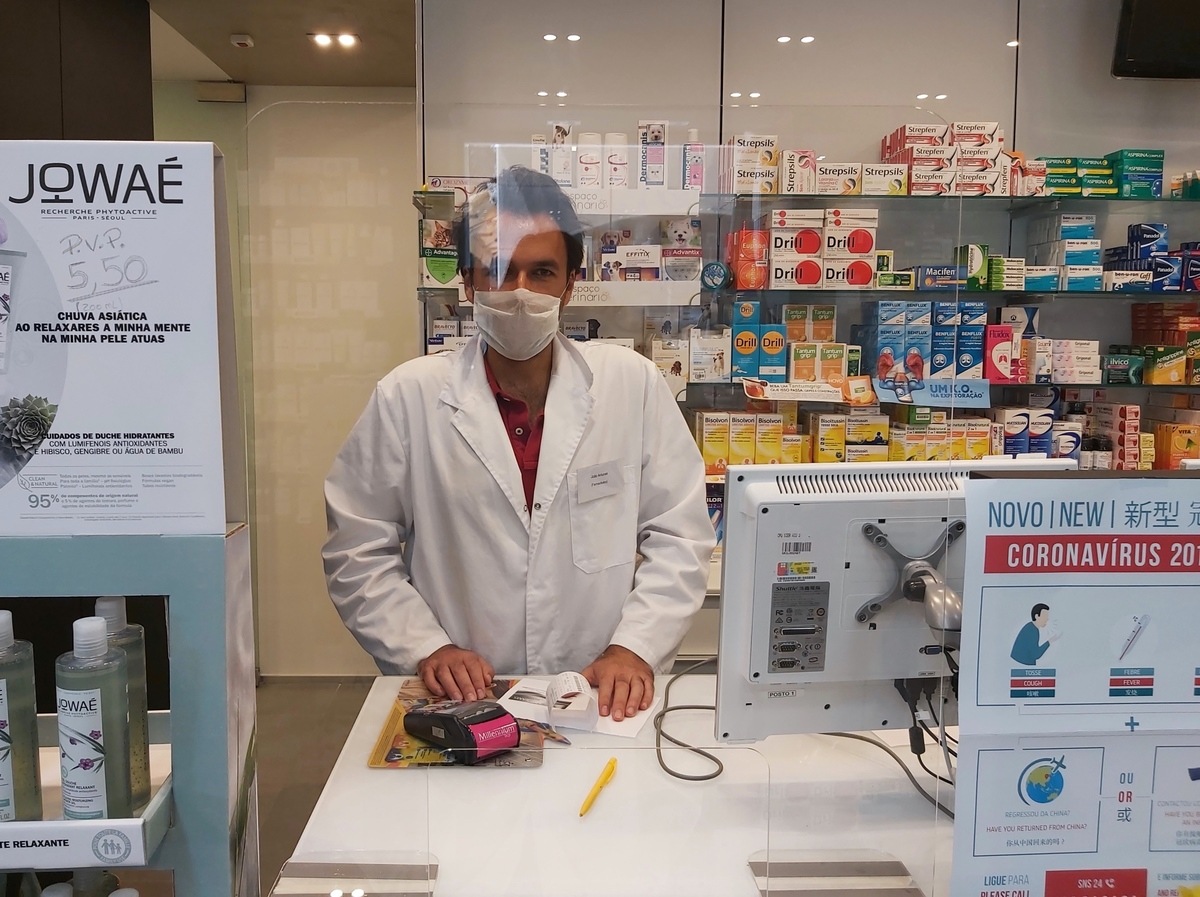
João Antunes. Photo by Anita Lekic.
Portugal, a country roughly equivalent in size to Pennsylvania with a population of 10,276,617, registered its first coronavirus case on March 2. The country imposed a state of emergency on March 2. By April 23, 785 people died and 21,982 have been infected with the virus.
I live in Monte Estoril, a small town with some 26,400 residents. On March 11 of this year, with Covid-19 news dominating the headlines, I went to a nearby medical clinic for outpatient surgery. When I was cleared to go, I went home, packed a few things, and moved to a friend’s house, settling in for the long wait of uncertainty that lay ahead.
Over the following five weeks, I developed a weekly routine of dropping by the independently-owned pharmacy, Farmácia Ostende, in Monte Estoril, to get my prescriptions filled. As the numbers of deaths and infections skyrocketed worldwide, the two attending pharmacists – Rafael Hartmann and João Antunes, both 33 – were looking haggard and drained. The regular staff of six working at the pharmacy in normal circumstances had been reduced to three – employees without families and kids at home. They were working long hours without any special gear to protect them. I was able to walk right up to the counter, get my medication, and pay for it with cash or a card.

Farmácia Ostende. Photo: Anita Lekic.
As news of the pandemic swirled around us, and with stores and business closed, the landscape of my small town changed. Monte Estoril, a popular tourist spot on Portugal’s Atlantic coast, was now eerily deserted. If I ran into a single person on the way to the pharmacy, I was given wide berth as if I had the plague.
In these circumstances, as in normal ones, pharmacies play an important role as the primary point of contact between residents and the healthcare system. “In the first two weeks of the Covid-19 outbreak,” Hartmann told me, “we were swamped by patients afraid that the prescribed medications they were taking would run out.” He was right. Once my prescriptions had run out, I was still able to buy my medications by paying full price. Pharmacies here will issue customers special receipts and when customers return with a prescription, they will reimburse the difference in cost, a difference subsidized by the Portuguese state. Portugal currently spends approximately 9% of its GDP on healthcare, ranking 12th among the European countries in healthcare expenditure.
In the second half of March, the pharmacy introduced more stringent measures: red floor markers kept customers at a safe distance and the number of customers was curtailed: only one person per attending pharmacist was allowed inside at a time.

Rafael Hartmann. Photo: Anita Lekic.
I asked Antunes about the psychological toll of working without respite in an abnormal situation: “There were a couple of weeks when we couldn’t even stop for lunch because we had so many customers in the pharmacy,” he said. “Those first two weeks were completely crazy. After a few days though, you get into the rhythm and you get used to it. To be honest, it’s easier to do the job when we have a lot of customers because time goes by faster.” The pharmacy hours are weekdays from 9 a.m. to 7 p.m. and Saturdays from 9 a.m. to 1 p.m., but every fortnight, Hartmann and Antunes work 36-hour shifts.
Hartmann agrees and points out that even in normal circumstances, stress is common among pharmacists: “We’re more than just a medical care provider; we also extend psychological support to many people who have complicated illnesses or even difficulties in their lives. And there are always those who take out their frustrations on us. With the coronavirus outbreak, these frustrations soared, and the pressure on us mounted, since we were only three, and we barely had time to catch our breath.”
Three weeks into the crisis, the pharmacy installed plexiglass shields. Nonetheless, customers still had to approach the counter to make their payment. Antunes continues to work without a mask or gloves, disinfecting his hands with alcohol after contact with customers. “Sometimes you’re so utterly exhausted or you begin to cough and then all of a sudden you become paranoid, but the feeling is fleeting, because you have no time to think about anything except the work you have to do in the pharmacy. We cope by living in the moment.”
Both Hartmann and Antunes are frontline workers facing significant exposure to Covid-19 through their jobs. Are they getting any form of hazard pay? The answer is negative. They are paid their regular monthly salaries in the 1,000 euro range (approximately $1,080) received by pharmacists in Portugal. “Lots of people thank us for our help and the psychological support we provide,” Hartmann says. “What matters most to us is that we are helping people with their health at a time like this.” Antunes agrees: “Despite the danger, it’s thrilling to know that I’m providing a service that has such a big impact on people’s lives.”